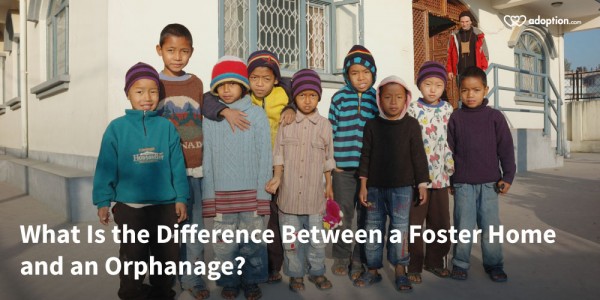One of the most common questions individuals and/or couples ask when researching options related to adoption is, what is the difference between foster care and an orphanage? Is there really any difference? And does one provide a healthier and more stable environment over the other? The answers may surprise you.
One distinct difference between orphanages and foster care is that modern day orphanages no longer exist in the United States, though they continue to be used in many countries around the world. In the United States, foster care and domestic adoption have taken the place of orphanages. But regardless of the nationality, many are very concerned over the care being provided in one or the other and have many misconceptions.
Children are placed in foster care typically because they have been removed from their homes by the state due to lack of proper care, and/or the parents/guardians are unable to care for their children for various reasons. Whereas children in orphanages have been orphaned, abandoned, or left there by parents who are unable to care for them for various reasons—typically due to lack of finances to properly care for them. They want more for their children than they can provide at the time.
Many may tend to believe that foster care is more nurturing that an orphanage because the child(ren) are cared for in a family setting rather than an “institution.” However, just because foster care takes place in a family setting does not mean that they are receiving better care. While there are many wonderful group homes and amazing foster parents, there are other settings that may not be as positive.
There are several reasons people become foster parents. Most do it because they want to provide a home for children in crisis. However, a few have reasons that may not necessarily relate to the well-being of the child. Since foster parents are given monetary compensation by the state in which they reside, that can sometimes be an incentive alone for fostering children. Likewise, a foster family may or may not have the adequate resources to provide the best nutrition, environment, or care for the child(ren). And the state may not always provide the most detailed oversight of that family. Sometimes children in foster homes are neglected and abused.
However, it is important to realize that the positive environments and enrichment provided to children in good foster homes far outweigh the less-than-optimal situations some encounter. This may be the only short-term stability that some children ever know.
Just as foster homes have pros and cons, so do orphanages. Neither are really ideal settings for children, but both can provide a wonderful, nurturing environment that they may not otherwise receive. Many tend to think that orphanages do not have the proper staff to give the needed one-on-one attention to the children. However, that trend is changing as many have increased resources, staffing, and programs. Foreign assistance is ever increasing so that more children are receiving the attention and care that they need.
That does not mean that all orphanages are on the upswing. There are still those in vast and third world regions of the world that do not have the resources required to provide adequate care for their children. One-on-one attention is impossible, which leads to many physical and development delays. The environment may be unbearable by our standards. Abuse can also occur in these environments.
Whether you are discussing foster care or orphanages there will always be some risks involved, and some may not even be apparent until you adopt the child. In either case there is a risk for lack of prenatal care, drug/alcohol abuse, and physically or emotionally abusive environments, not to mention the effects of being relinquished. But every child living in foster care or an orphanage deserves a loving and nurturing home and did not ask for any of this. Fortunately, children are resilient.
The key, as is with any adoption, is to do your research, be well-informed and prepared, and be willing. All children, no matter their origin or circumstances, are worth every ounce of effort it may take to help them overcome the ill effects of their early hard experiences. They all deserve a warm, loving, and nurturing environment to call home.

